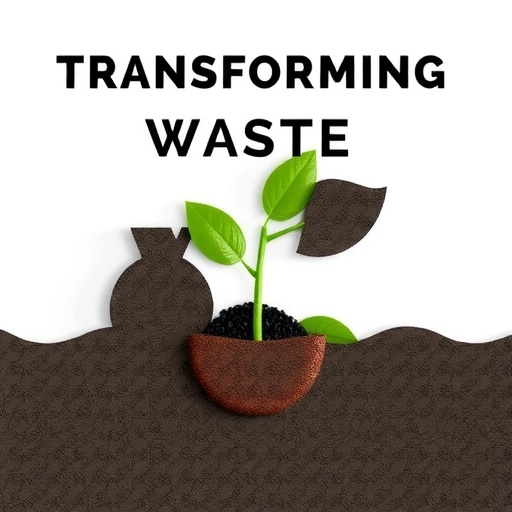In an era where sustainability takes center stage in scientific research, a remarkable study led by Tantavoranart and colleagues proposes an innovative solution that transforms waste materials into biochar-based products. This research aims not only to mitigate environmental pollution but also to create valuable resources for industrial processes. The crux of the study revolves around utilizing waste as a feedstock for biochar that can subsequently be used for wastewater treatment and as an alternative fuel source for bio-ethanol production.
Biochar production is the pyrolysis of organic materials, a process that results in a carbon-rich substance with a multitude of applications. The significance of biochar extends beyond its carbon sequestration capabilities; it also demonstrates properties that enhance soil fertility and mitigate greenhouse gas emissions. In the context of this research, the production of biochar from waste holds a dual advantage: it diverts waste from landfills while generating a beneficial material that can improve both environmental and industrial paradigms.
The researchers emphasize that industrial wastewater is a pressing issue that requires immediate attention. Traditional treatment processes can be ineffective, leading to severe environmental consequences. Therefore, this study introduces the biochar-based materials as a novel solution to this ongoing problem. By employing biochar as a filtration medium, the researchers aim to demonstrate its efficacy in removing contaminants from wastewater, particularly heavy metals and organic pollutants.
Furthermore, the study meticulously documents the processes involved in creating biochar from various waste sources. These sources include agricultural residues, food waste, and other organic materials. The versatility of feedstock allows for the adaptation of biochar production based on the available waste in different regions. This adaptability is essential for promoting wide-scale adoption, as it resonates with local waste management practices and resource availability.
In addition to its application in wastewater treatment, biochar generated from waste resources presents an opportunity for energy recovery. The researchers explore its dual role, where biochar not only serves as a medium for cleaning contaminated water but also acts as a renewable energy source in the form of biofuel in bio-ethanol production. This dual application underscores the importance of integrating biochar technology into existing industrial frameworks, leading to enhanced resource efficiency.
The implications of this research are far-reaching. By converting waste into biochar, industries can reduce their environmental footprints while simultaneously providing an alternative to fossil fuels. This aligns with global sustainability goals and illustrates a promising pathway toward a circular economy where waste becomes a valuable resource rather than a burden.
On a technical level, the methodology of converting waste into biochar involves several critical parameters that the researchers thoroughly analyze. These parameters include pyrolysis temperatures, residence times, and the type of feedstock used. Each of these factors influences the physical and chemical properties of the resulting biochar, including its porosity, surface area, and adsorption capacity.
The study also highlights the importance of optimizing each stage of the biochar production process. By fine-tuning these variables, the researchers hope to enhance biochar quality while maximizing the removal efficiencies of contaminants from wastewater. This aspect of the research underscores a vital intersection between environmental engineering and material science, leading to innovative solutions in both domains.
Moreover, the research presents compelling case studies that illustrate the successful application of biochar in real-world settings. Through pilot projects, various industries have implemented biochar-based wastewater treatment solutions, showcasing not only the feasibility of the technology but also the economic advantages. These case studies provide critical evidence that can convince stakeholders of the viability of integrating biochar into industrial operations.
In conclusion, the study by Tantavoranart and colleagues represents a significant stride toward advancing sustainable industrial practices. By innovatively transforming waste into biochar, the research advocates for a comprehensive approach to tackling environmental issues while simultaneously benefiting industrial processes. As we move towards a future where sustainability is paramount, projects like these offer hope and direction in overcoming the challenges of waste management and energy production.
This groundbreaking research has the potential to influence policy and inspire further developments in the field of environmental science and resource recovery. With the supporting data from extensive examinations and real-world applications, biochar may soon emerge as a cornerstone of sustainable industrial practices across various sectors.
Scientists, policymakers, and industry leaders alike are encouraged to explore the findings and implications of this study. As the world navigates the complexities of environmental degradation and resource scarcity, initiatives that fuse sustainability with innovative practices stand out as critical pathways towards achieving a more resilient and eco-friendly future.
Subject of Research: Transforming Waste into Biochar for Wastewater Treatment and Biofuel Production
Article Title: A sustainable model of transforming waste into biochar-based materials for industrial wastewater treatment and reuse as fuel in the bio-ethanol production process.
Article References:
Tantavoranart, S., Saricheewin, K., Siriratsakul, K. et al. A sustainable model of transforming waste into biochar-based materials for industrial wastewater treatment and reuse as fuel in the bio-ethanol production process.
Environ Sci Pollut Res (2025). https://doi.org/10.1007/s11356-025-37175-9
Image Credits: AI Generated
DOI: https://doi.org/10.1007/s11356-025-37175-9
Keywords: Waste Transformation, Biochar, Wastewater Treatment, Biofuel Production, Sustainability, Pyrolysis, Circular Economy.




